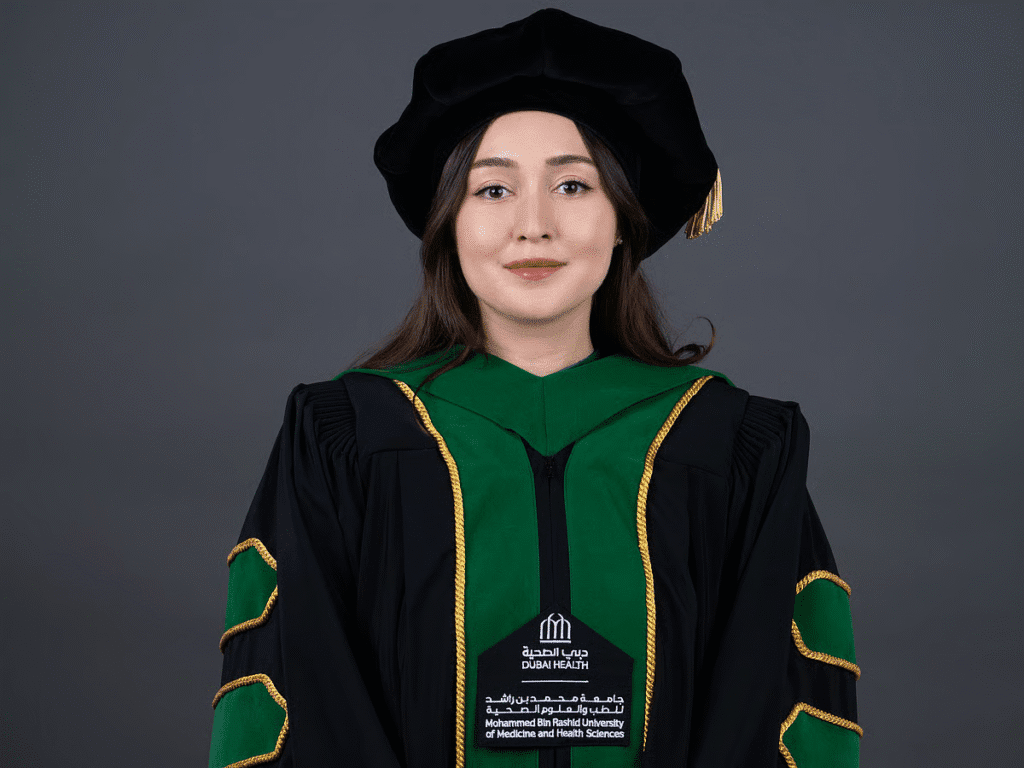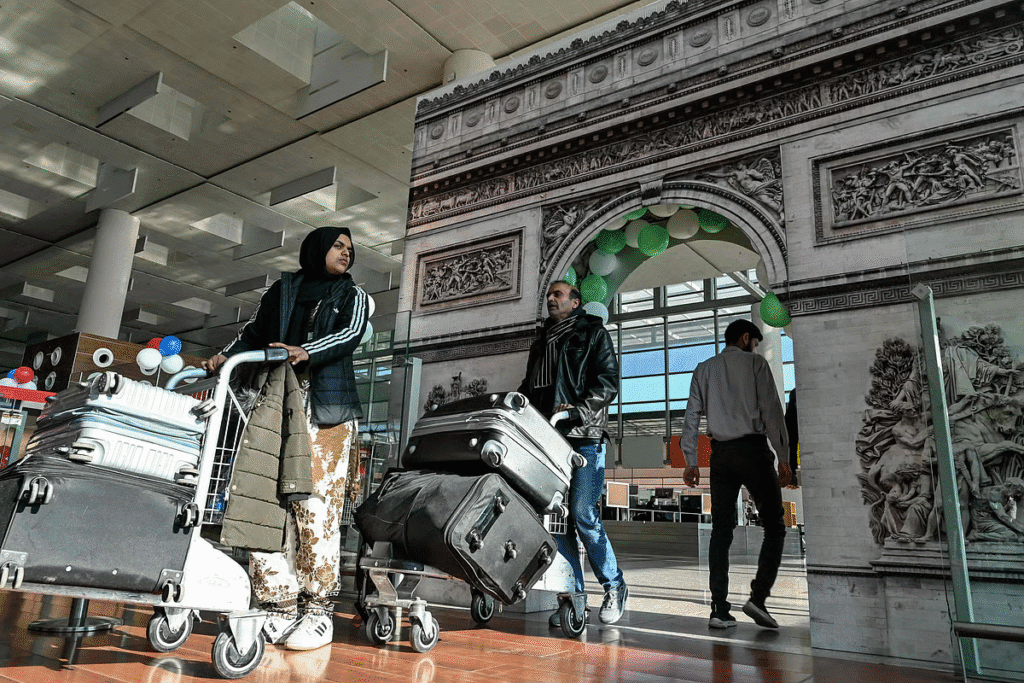Dubai biomedical PhD graduates have made history by becoming the first cohort to complete their Doctor of Philosophy in Biomedical Sciences at Mohammed Bin Rashid University of Medicine and Health Sciences (MBRU). These graduates are already making an impact in two of the world’s most urgent healthcare challenges: fighting cancer and combating antibiotic-resistant superbugs. Their work not only advances science in the UAE but also contributes to global medical research.
A New Era in Biomedical Research
The launch of MBRU’s Doctor of Philosophy in Biomedical Sciences program represents a critical step in developing the UAE’s scientific expertise. This four-year, fully sponsored program is designed to nurture highly skilled researchers capable of making meaningful contributions to both national and global health initiatives.
The program offers a curriculum that spans genetics, cancer biology, infectious diseases, and translational medicine. Its goal is to ensure that discoveries made in the lab can be effectively applied in clinical settings to improve patient care. By fostering a culture of research and innovation, MBRU is helping Dubai establish itself as a hub for biomedical advancement.

Shakhzada Ibragimova: Advancing Cancer Research
Kazakhstani researcher Shakhzada Ibragimova focused her doctoral research on Triple-Negative Breast Cancer (TNBC), an aggressive and hard-to-treat form of breast cancer. TNBC often resists standard chemotherapy, making it one of the most challenging cancers to treat.
Under expert guidance, Ibragimova explored the role of the protein FOXC1, which allows cancer cells to survive chemotherapy. Her research revealed that targeting FOXC1 could enhance the effectiveness of existing treatments and provide new options for patients struggling with resistant forms of breast cancer.

Her work is particularly valuable because it addresses a gap in localized cancer research. By investigating molecular mechanisms in cancer cells, Ibragimova is contributing to a global understanding of TNBC while offering insights relevant to the UAE’s population. Her findings may pave the way for clinical trials and the development of personalized cancer therapies in the region.
Syrine Nouara Boucherabine: Tackling Superbugs
Algerian researcher Syrine Nouara Boucherabine focused her PhD on antimicrobial resistance, specifically Methicillin-Resistant Staphylococcus aureus (MRSA), a dangerous pathogen responsible for serious infections worldwide. MRSA is increasingly difficult to treat due to its resistance to multiple antibiotics, which poses a major threat to public health.

Boucherabine employed a multiomics approach to study MRSA strains prevalent in the UAE. Her research mapped resistance patterns, identified key genetic markers, and proposed strategies for infection control and prevention. By providing a comprehensive understanding of how these superbugs evolve and spread, her work is crucial for informing public health policies and improving hospital infection management.
The significance of her research lies in its direct application to the local healthcare system. With rising cases of drug-resistant infections, Boucherabine’s findings will help medical professionals develop better treatment protocols and containment measures, ultimately saving lives.
Bridging Laboratory Research and Real-World Impact
The pioneering work of Dubai’s first biomedical PhD graduates illustrates the critical connection between laboratory discoveries and real-world healthcare outcomes. Both Ibragimova and Boucherabine demonstrate how localized research can address global challenges while also providing solutions tailored to the UAE’s specific needs.
Their studies highlight the value of investing in advanced research programs and nurturing scientific talent. By fostering innovation and equipping researchers with the necessary tools and guidance, Dubai is building a foundation for breakthroughs in cancer therapy, infectious disease management, and other critical areas of healthcare.
Building a Research-Driven Future
The graduation of these PhD students also signals a broader commitment to research and innovation in Dubai. The city is steadily becoming a hub for scientific exploration, attracting talent from around the world and encouraging collaborations across institutions and industries.
Future biomedical research in Dubai is expected to focus on translational science, ensuring that laboratory discoveries quickly inform clinical practice. This approach will accelerate the development of new therapies, diagnostic tools, and public health strategies, creating tangible benefits for patients and society at large.
The success of these first graduates will inspire the next generation of scientists to pursue advanced degrees and contribute to Dubai’s growing reputation as a center of scientific excellence. Universities and research institutions are likely to expand programs, establish research centers, and provide more funding to encourage innovation in healthcare and biotechnology.
The Global Significance of Dubai’s Biomedical Research
While the graduates’ work addresses local health concerns, it also contributes to the global scientific community. Research on TNBC and antimicrobial resistance has worldwide implications, influencing treatment approaches, public health policies, and future scientific studies.

Dubai’s investment in high-quality education and research infrastructure positions it as a strategic player in tackling some of the most pressing health challenges globally. The knowledge generated by these PhD graduates can inform international collaborations, improve patient outcomes, and strengthen global efforts to combat cancer and superbugs.
Inspiring the Next Generation of Scientists
The achievements of these biomedical PhD graduates are an important source of inspiration for aspiring researchers in the UAE and beyond. Their work demonstrates the impact of dedication, innovative thinking, and rigorous scientific training.
Programs like MBRU’s PhD in Biomedical Sciences show young scientists that it is possible to address critical health problems while building a rewarding career in research. Encouraging students to pursue advanced degrees in medicine, biotechnology, and biomedical sciences will be key to sustaining Dubai’s growing role in global healthcare innovation.
Conclusion
Dubai’s first biomedical PhD graduates have set a powerful precedent for scientific research and innovation in the region. By tackling complex challenges such as chemotherapy-resistant cancer and antibiotic-resistant superbugs, they demonstrate the potential of advanced research to create meaningful change in healthcare.
Their work exemplifies the importance of investing in education, fostering research talent, and supporting programs that bridge laboratory discoveries and clinical applications. As Dubai continues to grow as a hub for scientific and medical innovation, the contributions of these graduates will serve as a foundation for future breakthroughs, improving health outcomes both locally and globally.
The success of these pioneers is not just a milestone for Dubai but a signal to the world that the UAE is committed to advancing scientific knowledge and addressing some of humanity’s most pressing health challenges. Their achievements inspire hope and set the stage for a future where innovative biomedical research can save lives, combat deadly diseases, and strengthen healthcare systems worldwide.
Do follow UAE Stories on Instagram
Read Next – Unlocking Excellence: How Dubai Central Lab Transforms Modern Healthcare














